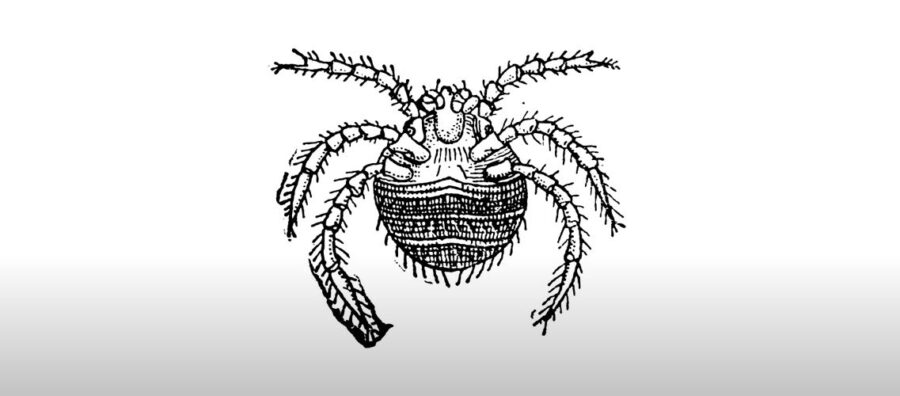Is your dog itchy? Are you seeing tiny little red bugs in your home? Can Dogs Bring Chiggers in the House?
Do chiggers make dogs sick? Do these tiny bugs like to go after dogs? Why does your dog have chigger bites?
In this article, we’ll discuss if dogs can bring chiggers into the house.
Can Dogs Bring Chiggers in the House?
Dogs can definitely bring chiggers into your home. In order to keep your dogs away from chiggers, you should continue to keep up with regular tick treatments that also work well for chiggers.
If you are concerned about your dog carrying chiggers, check to see if there is persistent itching, swelling, redness or other symptoms that may lead to getting checked out by a vet.
 Why Does My Dog Have Chiggers?
Why Does My Dog Have Chiggers?
Your dog is making contact with microscopic or slightly larger parasites such as fleas, ticks, mites and also chiggers. Chiggers are a type of spider mite. It’s very difficult to see them on your dog’s skin or fur.
Chiggers do not burrow into your dog’s skin and can be washed away with warm water and soap. Chiggers can multiply inside your home as they can be brought in from your pet.
You might need an exterminator at this point if you see many of these tiny little parasites or feel their bite on your skin while you are at home.
If you have flea and tick medication like advantage or Frontline for your dog, they will cover chiggers as well.
Can Chiggers Infest Your House?
No. It is not common for chiggers to infest homes because they do not remain attached to their host for much longer than a day or two. Chiggers do not borrow into the skin of humans or dogs to consume their blood.
Chiggers come from the larvae of harvest mites. They prefer to live under the surface of soil or just above it. Bed bugs, fleas, ticks and mosquitoes are much more commonly found in our homes.
A chigger may have been brought in accidentally by hitching a ride on your dog, but its aim is to live comfortably in nature close to the soil.
Do Chiggers Go After Dogs?
No. Chiggers will end up on a dog because of your canine companion’s interaction with the surrounding nature in which chiggers reside.
Your dog needs pet treatment medication to kill ticks, mites and fleas. Medications such as Frontline or Advantage also repel and kill chiggers.
Chiggers will not go after any dog that is treated with such medication or carries a collar that repels fleas and ticks.
Thankfully, chiggers do not tend to move from a dog to a person. Chiggers eat the decayed plant matter and also insects found in the soil . They are not considered a pest for humans or dogs.

How Can You Tell if Your Dog Has Chiggers?
If you suspect that your dog has chiggers on his or her body, you must look for the following symptoms:
- Red bumps on the body that look raised
- A rash on the skin, feet, stomach, nose, ears and head
- Excessive scratching and broken skin
- A crust layer of dry skin that looks orange
- Loss of hair
- Patches of hair loss or redness on the skin
Chigger bites are extremely frustrating and itchy for your dog. A chigger is looking for liquefied or dead skin but is not trying to burrow into your dog’s skin to feast on his or her blood.
Chiggers are not pests for humans and pets and do not attach firmly on skin the way that ticks do. A chigger can be washed off easily with soap and gentle scrubbing.
What Do You Do if Your Dog Has Chiggers?
Do not be concerned or alarmed to the point where you need to go to a vet if your dog has chiggers. Start with the first step which requires you to wash your canine companion.
- Create a warm bath.
- Add 2 cups of Epsom salts (optional).
- Use plenty of natural dog shampoo or flea and tick shampoo.
- Scrub gently.
- Lather the soap and let it sit for 2-3 minutes.
- Make sure to gently scrub your dog’s behind your dog’s ears.
- Apply soothing ointment or antibiotic ointment if you notice any chigger bites (optional).

How do Chiggers Attach to Dogs?
Chiggers are sometimes very hard to notice because they are the larvae of harvest mites or scrub mites. They feed off of dead skin, liquefied skin or decayed plant matter.
Even though chiggers are parasitic, they are only looking to feed off the fluids that are found on skin cells. This includes your dog and most of us as well.
They can attach to the pores of your favorite animal and our own hair follicles. Chiggers inject digestive enzymes and they enjoy feeding off of ruptured skin cells.
This leaves us with itchy red bumps. Dogs and humans are both affected by chiggers, but since they are not looking to burrow into our skins, they will fall off of our body with warm water and soap.
Conclusion
It’s become a routine in our home to stop at the front door and use a wet towel to wipe our canine companion’s feet. She waits for me to gently inspect between her toes and gently wipe her feet and as well as a quick look around her fur for any bumps, bites or burrowing ticks and mites.
The best routine is her monthly dose of Frontline on the back of her neck. We are out in a forest park every morning and she is off her leash investigating tall grasses, roots of plants and tree barks.
She makes contact with bugs, ticks and chiggers, but they don’t come home with her. This is because she is treated with medication that repels or kills them. She is also inspected and wiped down before entering our home.
Thanks for visiting ThePestManagement.com for the best information to help you to make the pest control process easy, safe & affordable.

 Why Does My Dog Have Chiggers?
Why Does My Dog Have Chiggers?